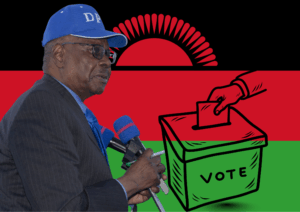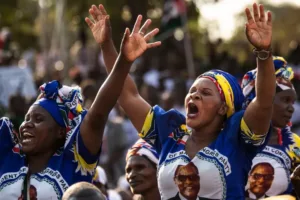NEWS

IN BRIEF
On 23 September 2025, Malawians went to the polls, […]
SHARE
 On 23 September 2025, Malawians went to the polls, across 193 constituencies, to elect the president and member of parliament in a general election where 7.2 million people registered to vote.
On 23 September 2025, Malawians went to the polls, across 193 constituencies, to elect the president and member of parliament in a general election where 7.2 million people registered to vote.
Former president Professor Mutharika won the election with 56.8% of the vote, against incumbent Lazarus Chakwera’s 33%. According to results announced by MEC. The incumbent, Lazarus Chawera, secured a paltry 33% of the vote, a result many attribute to poor performance of the economy and the 28% inflation increase, essential goods shortages, climate disasters and international aid cuts. The Afrobarometer (2023) notes that the majority of Malawians including the youth prefer and trust the “wisdom of the elderly” than young and fresh ideas from young political leaders.
The elections did not only decide leadership but also tested the independence of institutions, citizen trust, and electoral integrity. This article unpacks lessons under key themes: voter participation, institutional credibility, transparency and information flow, media influence, civil society engagement, international observation, and long-term reforms for accountability.
Voter turnout and apathy

Malawi Congress Party supporters cheer at a campaign rally in Blantyre on September 7, 2025 [Thoko Chikondi/AP Photo]
Institutions and credibility
The electoral process drew significant public interest and participation. It served as a reminder that elections are not just about casting votes but also about testing the strength and independence of the institutions that oversee them, such as the Malawi Electoral Commission. The credibility of such an institution and the trust it commands influence whether citizens see the outcome as fair, credible and transparent. What stood out was not only the administration of the election but also how the broader electoral environment, including media narratives and online debates, shaped public scrutiny of the process. Citizens demonstrated greater agency by using online platforms to question decisions that could undermine transparency. For example, the Malawi Communications Regulatory Authority (MACRA) ordered the deactivation of election results dashboards on mainstream media and online platforms, sparking extensive online discussions about transparency and the timely reporting of results.
Misinformation and Disinformation
Equally pressing was the problem of misinformation and disinformation. In the lead-up to the 2025 polls, several false narratives circulated online, threatening to undermine trust in the process. While social media platforms expanded access to the political discourse, it also became a breeding ground for false narratives, including unfounded allegations about integrity of the voters roll and election rigging.
The MEC noted that citizens living in areas with limited access to information face widespread misinformation and disinformation. Civil society organizations, made concerted efforts to counter false narratives on the electoral process by sharing information from the commission.
Media’s Double-Edged Role
The media played a double-edged role in Malawi’s 2025 elections. The media was polarised based on the preferred candidate. Privately owned radio stations and online outlets provided timely coverage and created space for citizens’ voices, helping to broaden accountability. On the other hand, there were uneven reporting and clear partisan leaning in some outlets, which fueled perceptions of bias, while a few sensational headlines amplified unverified claims. This highlighted both the power and fragility of the media in shaping the public trust. In the future, two key priorities are crucial: strengthening media ethics and training to ensure coverage remains balanced and factual, and fostering stronger collaboration between journalists and fact-checkers to curb the spread of misleading narratives during elections.
Civil Society as Watchdogs
Civil society remained a vital watchdog during Malawi’s 2025 elections, mobilizing citizen observers, documenting irregularities, and pressing for transparency. Organizations like the Malawi Human Rights Commission played a key role in election monitoring and created platforms for citizen voices offering rapid responses to emerging concerns. Their presence not only deterred malpractice but also showed that electoral accountability is achieved when citizens and civic groups, alongside institutions, actively hold leaders to account.
International Observers
International observers, including missions from the African Union and the European Union, provided independent assessments of the process. While their presence alone does not automatically lend credibility, their evaluations remain valuable, particularly when their recommendations are acted upon as rightfully emphasized in their reports.
While generally noting improvements in transparency, they also highlighted persistent issues such as logistical delays and uneven application of procedures. Their reports remind us that democracy is a shared global value, but its sustainability depends on how local actors respond to recommendations. The challenge lies in ensuring that these observations do not remain as external critiques but become actionable lessons embedded in domestic reforms.
Lessons and Recommendations

The 2025 elections provided several key lessons for Malawi and the broader African context. Elections require trust in institutions, resilience against misinformation, and a media that informs rather than inflames. A key lesson is that accountability cannot be an afterthought; it must be embedded throughout the process, from voter registration to results transmission. There is a need to strengthen digital literacy and a continued effort to bolster the capacity and independence of electoral institutions like the MEC to safeguard credibility and public trust.
Conclusion: Resilience and Democratic Commitment
Malawi’s 2025 elections are evidence to the country’s resilience and commitment to democratic principles. While challenges such as misinformation and media bias persisted, the overall process demonstrated the importance of electoral accountability in fostering a vibrant democracy. As Malawi continues to navigate its democratic journey, the lessons learned from these elections will be invaluable in strengthening the foundations of its political system and ensuring that the voice of the people remains paramount.
by Programs Associate: Translocal Projects (Digital Governance) – Rehemah Patricks
